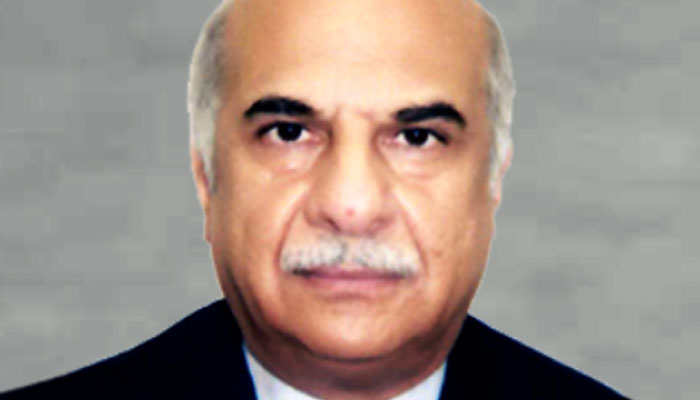Qualified nursing workforce pivotal for achieving UHC
ISLAMABAD: Newly appointed Deputy Chairman Planning Commission. Jehanzeb Khan, said that a well-trained and qualified nursing workforce is pivotal for achieving universal health coverage (UHC) and for any improvement in the health status of our population.
He was addressing a high-level consultative forum organised by the Planning Commission here on Thursday in collaboration with the Ministry of National Health Services Regulations and Coordination (MoNHSRC).
State Minister of Health Dr Zafar Mirza attended the policy forum and appreciated the Planning Commission for actively supporting the MoNHSRC on aligning investment in nursing and midwifery profession with the current and future needs of the health system in order to address the critical shortage of nurses in the country.
Dr Zafar Mirza informed the audience that despite all challenge and constraints, Pakistan will move forward with HEC’s decision of replacing the diploma with the bachelor nursing programme. The high-level forum brought together the senior officials of the Pakistan Nursing Council, Director Nursing and Controller Nursing Examination Board of all provinces to agree on priority policy interventions for effective nursing management, utilisation and for addressing the critical shortage of nursing in the country.
Speaking at the occasion, Member Social Sector, Dr Shabnum Sarfraz, said that the contribution of nursing workforce needs to be seen in a wider context of their role in the larger economy of the country than merely achieving the SDG3. She said that the Planning Commission, together with the Ministry of National Health Services, Regulation and Coordination, recognises nursing shortage as a priority agenda and is committed to making concerted efforts for strengthening the nursing and midwifery professions in the country.
Earlier this year, the President of Pakistan Dr Arif Alvi, declared 2019 as the “year of nursing” in recognition of their critical role in delivering quality healthcare and improving the health indicators. The Pakistan Nursing Council and the provinces provided an overview of the national and provincial nursing institutions, the programmes being offered and the current nursing output.
They further shared the existing nursing shortage, their preparedness for switching the diploma nursing programme into the Bachelor Programme and their plans for accelerating progress towards addressing the critical shortage of nursing in Pakistan. They identified policy areas for strengthening the nursing and midwifery profession. It was indicated that the number of nurses registered with Pakistan Nursing Council (PNC) was 2,759 BSN, 4,359 Post RN BScN, 210 MSN and 9 PhD in Nursing.
It was reported that the national annual intake for general nursing diploma in Pakistan is 9,935; diploma midwifery is 3,096; Community Midwifery Diploma is 4,006; Lady Health Visitor Diploma is 2,086; Family Welfare Worker Diploma is 555; Certified Nursing Assistant Diploma is 360; Generic BSc Nursing Programme is 1,780; Post RN; BScN Programme is 1935 and Master’s in Nursing in 95.
Dr Nausheen Hamid, Parliamentary Secretary Health, said that adequate numbers, quality and well-performing nursing workforce is crucial for effective functioning of health systems in the country.
She said that nursing shortage is a major impediment towards the attainment of universal health coverage. Ms Kanwal Shauzab, Parliamentary Secretary Planning Development & Reform in her concluding remarks reinforced the commitment of the government for creating a meaningful improvement in the health status of the people of Pakistan through priority investment in strengthening the nursing and midwifery profession. She reaffirmed that the Planning Commission will continue to provide backstopping for effective planning and resource mobilisation for improving the quality and number of nurses in the country.
-
 Andrew Mountbatten-Windsor Throws King Charles A Diplomatic Crisis
Andrew Mountbatten-Windsor Throws King Charles A Diplomatic Crisis -
 Barack Obama Hails Seahawks Super Bowl Win, Calls Defense ‘special’
Barack Obama Hails Seahawks Super Bowl Win, Calls Defense ‘special’ -
 Pregnant Women With Depression Likely To Have Kids With Autism
Pregnant Women With Depression Likely To Have Kids With Autism -
 $44B Sent By Mistake: South Korea Demands Tougher Crypto Regulations
$44B Sent By Mistake: South Korea Demands Tougher Crypto Regulations -
 Lady Gaga Makes Surprising Cameo During Bad Bunny's Super Bowl Performance
Lady Gaga Makes Surprising Cameo During Bad Bunny's Super Bowl Performance -
 Paul Brothers Clash Over Bad Bunny's Super Bowl Performance
Paul Brothers Clash Over Bad Bunny's Super Bowl Performance -
 South Korea: Two Killed As Military Helicopter Crashes During Training
South Korea: Two Killed As Military Helicopter Crashes During Training -
 Elon Musk Unveils SpaceX’s Moon-first Strategy With ‘self Growing Lunar City’
Elon Musk Unveils SpaceX’s Moon-first Strategy With ‘self Growing Lunar City’ -
 Donald Trump Slams Bad Bunny's Super Bowl Performance: 'Absolutely Terrible'
Donald Trump Slams Bad Bunny's Super Bowl Performance: 'Absolutely Terrible' -
 Jake Paul Criticizes Bad Bunny's Super Bowl LX Halftime Show: 'Fake American'
Jake Paul Criticizes Bad Bunny's Super Bowl LX Halftime Show: 'Fake American' -
 Prince William Wants Uncle Andrew In Front Of Police: What To Expect Of Future King
Prince William Wants Uncle Andrew In Front Of Police: What To Expect Of Future King -
 Antioxidants Found To Be Protective Agents Against Cognitive Decline
Antioxidants Found To Be Protective Agents Against Cognitive Decline -
 Hong Kong Court Sentences Media Tycoon Jimmy Lai To 20-years: Full List Of Charges Explained
Hong Kong Court Sentences Media Tycoon Jimmy Lai To 20-years: Full List Of Charges Explained -
 Coffee Reduces Cancer Risk, Research Suggests
Coffee Reduces Cancer Risk, Research Suggests -
 Katie Price Defends Marriage To Lee Andrews After Receiving Multiple Warnings
Katie Price Defends Marriage To Lee Andrews After Receiving Multiple Warnings -
 Seahawks Super Bowl Victory Parade 2026: Schedule, Route & Seattle Celebration Plans
Seahawks Super Bowl Victory Parade 2026: Schedule, Route & Seattle Celebration Plans




